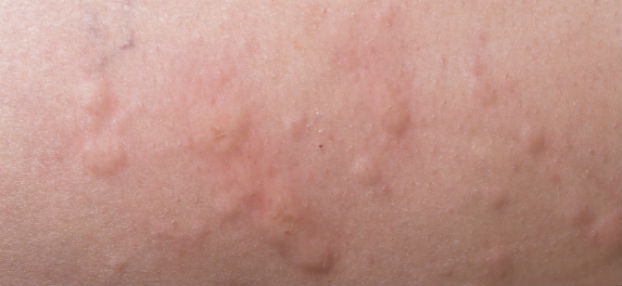Urticaria is a rash with itchy bumps and patches with pale to red color. It appears without notice and are mostly transient while some remain even for a longer period. Most forms are limited to the skin but they can also expand to the respiratory tract, sometimes even leading to life threatening conditions.
For arranging an appointment for treatment of hives in Vienna, please contact our office by phone +43 1 40114/5701, email ordination@hautarztokamoto.at or use the online-form.
Information about hives (urticaria) by dermatologist Prof. Dr. Okamoto in Vienna
Typical symptoms of urticaria

Urticaria resembles mosquito bites in appearance and symptoms. In principle, they can appear everywhere on the body. The single lesions can be in the size starting from a few millimeters to centimeters and tend to confluence or to merge to reach a large size. This rash can disappear within a few hours, reoccurring again on the same spot or on different parts of the body. In an extreme situation, swelling can expand on the entire surface of the body. Once swelling affects the lips and the tongue, it can continue to the palate down to the larynx, obstructing the respiratory tract. Shortness of breath and suffocation can be the consequence under this condition. Further symptoms can be lowering of blood pressure with circulatory dysfunctions up to allergic shock.
Causes and triggers
The cause of urticaria is the production of histamine in specific cells of the immune system, the so called mast cells. This messenger causes the dilatation and leakage of blood vessels leading to an increase of interstitial fluid (edema). Histamine release of the mast cells can have systemic effects (see above). The course is very variable and can last just a few hours up to weeks and months. Chronic urticaria is a condition where the symptoms remain for more than 6 weeks. Note that some foods may contain histamine and can cause similar symptoms without causing an allergic reaction.
There are numerous triggers of histamine release by the immune syste. Urticaria after taking medication or certain food is common. If the symptoms occur repeatedly, an allergy test should be performed. Other triggers are infections, autoimmune diseases, cold temperature* (such as ice cubes), heat* or pressure*. Unfortunately, the trigger of urticaria remains obscure in many cases.
*after direct exposure to the skin
Common triggers
- drugs (e.g. pain killers, antibiotics, ACE inhibitors)
- food (seafood, red vine, cheese, etc.)
- Allergens (particularly food such as seafood, shellfish or nuts)
- Infections (bacteria, parasites, viruses)
- Internal diseases (thyroid dysfunction, autoimmune diseases, rheumatoid diseases)
- Insect bites
- physical exposure to cold, heat, water, pressure
3 characteristic features of hives:
- spontaneous patches or bumps on the skin (urtica)
- itchy sensation of the affected area
- hives are commonly transient but may reoccur on the same or different spots
Treatment
Treatment in acute situations is symptomatic. Usually, systemic antihistamines are sufficient to ease the symptoms (rash, itch). Should the symptoms persist or even spread, medical consultation is recommended. In severe cases, i.v. infusion therapy might be required. For acute urticaria, the prognosis is generally good as urticaria per se is self limited. In case of chronic urticaria, about 50% of the patients are free of symptoms after 6 months, while 10% thereof still require treatment even a year later.
Univ. Prof. Dr. Okamoto, specialist on skin diseases in Vienna (Austria), informs as a medical expert on dermatology and venerology about hives (urticaria) on netdoktor.at.
Contact Prof. Dr. Okamoto
For appointments, please contact us by phone +43 1 40114/5701, 5702 or 5703, or via E-Mail ordination@hautarztokamoto.at or contact form.
